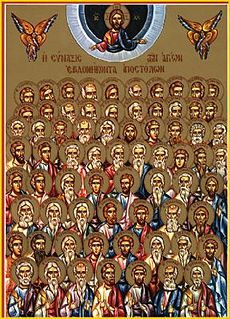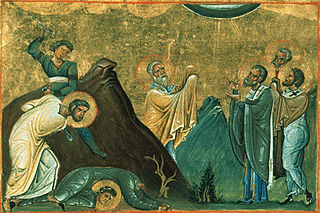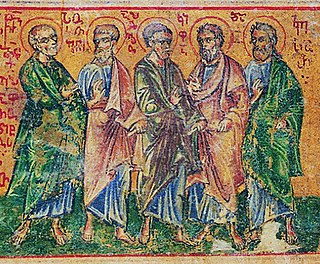Related Research Articles

The seventy disciples or seventy-two disciples were early emissaries of Jesus mentioned in the Gospel of Luke. According to Luke, the only gospel in which they appear, Jesus appointed them and sent them out in pairs on a specific mission which is detailed in the text.

Quartus was an early Christian who is mentioned in the Bible.

January 3 - Eastern Orthodox liturgical calendar - January 5

Ampliatus, was a Roman Christian mentioned by Paul in one of his letters, where he says, "Greet Ampliatus, whom I love in the Lord." He is considered one of the Seventy Disciples by the Eastern Orthodox Church. He may have served as bishop of Odessos (Varna), in Bulgaria. He is commemorated in the Roman Martyrology on Oct. 31.

Erastus, also known as Erastus of Paneas, is a person in the New Testament. According to the Epistle to the Romans 16:23, Erastus was a steward in Corinth, a political office of high civic status. The word is defined as "the manager of household or of household affairs" or, in this context, "treasurer"; The King James Version uses the translation "chamberlain", while the New International Version uses "director of public works". A person named Erastus is also mentioned in the 2 Timothy and Acts, and these mentions are usually taken to refer to the same person.

Urban of Macedonia is numbered among the Seventy Apostles. Along with the Apostles Ampliatus, Stachys, Narcissus of Athens, Apelles of Heraklion and Aristobulus of Britannia he assisted Saint Andrew. St. Andrew ordained Urban bishop in Macedonia. He died a martyr, and his feast day is October 31.
Apelles of Heraklion is numbered among the Seventy Disciples. Along with the Apostles Urban of Macedonia, Stachys, Ampliatus, Narcissus of Athens and Aristobulus of Britannia he assisted Saint Andrew. St. Apelles was bishop of Heraclea in Trachis. His feast day is October 31.

Herodion of Patras was a relative of Saint Paul whom Paul greets in Romans 16:11. According to tradition, he was numbered among the Seventy Disciples and became bishop of Patras, where he suffered greatly. After beating, stoning, and stabbing him, they left him for dead, but St. Herodion arose and continued to serve the Apostles.

Asyncritus of Hyrcania, also Asynkritos, was numbered among the Seventy Disciples. He was bishop of Hyrcania in Asia. Saint Paul mentions him in his letter to the Romans. The Church remembers St. Asyncritus on April 8.

Hermes of Philippopolis was one of the Seventy Disciples and was bishop in Philippopolis in Thrace. The Shepherd of Hermas is also traditionally ascribed to him. He is referenced in Romans 16:14, and his feast day is celebrated on May 31, on November 5 with Apostles Patrobas, Linus, Gaius, and Philologos, and on January 4 among the Seventy.
Hermes of Dalmatia is numbered among the Seventy Disciples. He was bishop in Dalmatia. He is usually identified with the Hermes mentioned by Paul in Romans 16:14. His feast days are celebrated on April 8 with his fellow martyrs, and on January 4 among the Seventy.

Gaius of Ephesus is numbered among the Seventy Disciples. He was Bishop of Ephesus. The Catholic Church remembers St. Gaius on January 4 among the Seventy, and on November 5.

Philologus of Sinope is numbered among the Seventy Disciples, and is commemorated with them on January 4. He is also commemorated on November 5 together with Ss. Patrobas, Hermas, Linus, and Gaius.

Sosipater is a person mentioned in the New Testament, in Romans 16:21. He is probably the same person as Sopater mentioned in Acts 20:4.

According to the New Testament book of Romans, Tertius of Iconium acted as an amanuensis for Paul the Apostle, writing down his Epistle to the Romans. He is numbered among the Seventy Disciples in a list pseudonymously attributed to Hippolytus of Rome, which is found in the margin of several ancient manuscripts.
Clement of Sardis is numbered among the Seventy Disciples. He was Bishop of Sardis. The Church remembers St. Clement on January 4 with the Seventy; April 22 with Ss. Nathaniel and Luke; and on September 10 with Ss. Apelles and Lucius.
Carpus of Beroea of the Seventy Disciples is commemorated by the Church on May 26 with Alphaeus, and on January 4 with the Seventy.
Fortunatus is person mentioned by St Paul in I Corinthians 16:17: I was glad when Stephanas, Fortunatus, and Achaicus arrived, because they have supplied what was lacking from you.

Cephas of Iconium is numbered among the Seventy Disciples, and was bishop of Iconium or Colophon, Pamphylia. The name "Cephas" is Aramaic for "Peter."

October 30 - Eastern Orthodox liturgical calendar - November 1
References
- This article is derived in whole or in part from Narcissus of Athens at OrthodoxWiki, which is dually licensed under CC-By-SA and GFDL. All relevant terms must be followed.